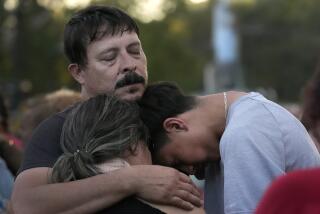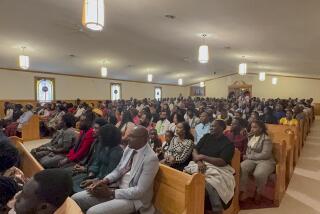Alabama tornadoes strike at heart of church community
Reporting from Pratt City, Birmingham and â Alabama pastor Tommie Lewis took one good look at his congregants and asked, âWhy?â
Four days after tornadoes ravaged their town and their state, they came ready to listen, and he came ready to preach.
âWhy is it that the deaths are now beyond 200 and approaching 300? Why do good people who live in their homes 50 years, never bothering nobody, have to get swept away? Why do folks who paid their car notes every month now have no cars? Why?â
Across the South, this day of worship couldnât have come soon enough. Baptists, Methodists, Presbyterians and others dusted themselves off, reached for their finest clothing â some donated, some borrowed â and flocked to God to refuel their faith and gather hope on a Sunday that Alabamaâs governor had declared a Day of Prayer.
The terrible spring storms killed at least 342 people, with Alabama absorbing the worst of it â 248 dead and many more missing. People were desperate for solace, healing and recovery. In the South, that means going to church.
Tornado photos
Scenes from the devastated South
At the Fair Park Arena in Birmingham, nearly 1,500 members of the Bethel Missionary Baptist Church gathered. Their Pratt City building had been reduced to rubble.
âNo, we donât have a house,â Lewis said. âBut we still have a church.â
Nearly 70% of Pratt City, a historic black neighborhood about five miles west of Birmingham, is now a wasteland. Lewis cited the book of Job and urged his congregation to turn their troubles into strength and help one another.
Lewis had wanted to retire next year, but he told congregants his plans had changed: âIâm going to be here until this is all done.â
Brenda Reynolds, a member of the choir, heard his words and felt at ease. Her home of 36 years was gone, but she knew the people of Bethel would take care of her.
Moments earlier, when Reynolds broke into sobs onstage, congregants held her and helped her drink water.
âThis is my family,â she said. âI know Iâm bruised, but Iâm not broken.â
Irene Trainer, better known as âMother Trainer,â said she awoke Sunday morning with a deep sense of sorrow. She and her daughter lost their houses. Trainer was celebrating her 78th birthday, and Lewis congratulated her during the service.
Trainer smiled and raised her arms to thank him.
âEvery word he said I needed to hear,â she said afterward. âI was starved and it was food for my soul.â
In Tuscaloosa County, where 40 people died, a tornado destroyed the fellowship hall and damaged the sanctuary at College Hill Missionary Baptist Church, an African American congregation founded in 1981.
Nearby, the predominately white University Church of Christ welcomed the College Hill congregation.
âWe made it through the storm, and weâre here to tell it!â College Hillâs associate pastor, the Rev. David L. Richardson, shouted. âThere is a miracle in the house today!â
The Rev. Kelvin W. Croom, the pastor, sat with his head buried in a washcloth, drenched in sweat and overcome with emotion. Slowly, he rose to address his weary 250-member congregation.
âThe flock will not be scattered because of this storm!â Croom shouted. âWe will rebuild! We will rebuild! We will rebuild!â
As he thanked the Church of Christ for the sanctuary, the College Hill congregation rose for a raucous standing ovation.
âSome say the church is over there,â Croom said, gesturing toward the ruins of his church several blocks away. âI say the church is wherever you go.â
Croom pointed out that the tornado had cut across class and racial lines â ârich people, poor people, black people, white people, Jews and Gentiles.â Now, he said, the people of Alabama need to move beyond racial and political divides and unite in rebuilding.
Just east of Tuscaloosa, where the bustle of the college town gave way to rolling country, members of the Cottondale Baptist Church gave up their Bible study classes.
A frantic assembly line operated in the basement fellowship room as women moved Styrofoam boxes down a series of tables, loading them with hot dogs, hamburgers, chips and cookies. The boxes were stacked amid piles of donated flashlights, diapers, baby food, toothpaste and blankets.
The unassuming brick church was undamaged, although some of its 450 members lost their homes. But the main focus of this largely white congregationâs largesse was African American and Latino neighborhoods in the nearby unincorporated community of Holt.
Contractor and church member Shane Hoggle, 33, said the tornado provided a way to cross what can seem like unbridgeable gaps between whites and minorities in 21st century Alabama.
âA lot of times itâs hard for us to go into that community,â he said. âI hate that it takes something like this to break that barrier.â
Since Friday, dozens of church members have been in Holt, removing fallen trees and nailing tarps over gaping openings in roofs.
At 10:30 a.m., workers left the basement and filled the pews. Pastor Dale Glover told them that tragedies reminded them of whatâs important â family, church and God.
âDo you know what Jesusâ hands look like this morninâ? They donât look like nail-scarred hands. They look like this,â Glover said, donning a pair of work gloves.
âWeâre goinâ on nearly 90 hours of 18 hours a day,â he said. âWe need your help.⌠If youâre saying this is my day of rest, well, Jesus would have been workinâ today.â
âIf you ainât got work clothes on, go get âem,â he said. âAnd if you say, âI canât believe so and so wore shorts to church today,â I will kick you out of this building. We are now a working church.â
Bermudez reported from Pratt City and Birmingham, and Fausset and Zucchino reported from Tuscaloosa.
More to Read
Sign up for Essential California
The most important California stories and recommendations in your inbox every morning.
You may occasionally receive promotional content from the Los Angeles Times.












